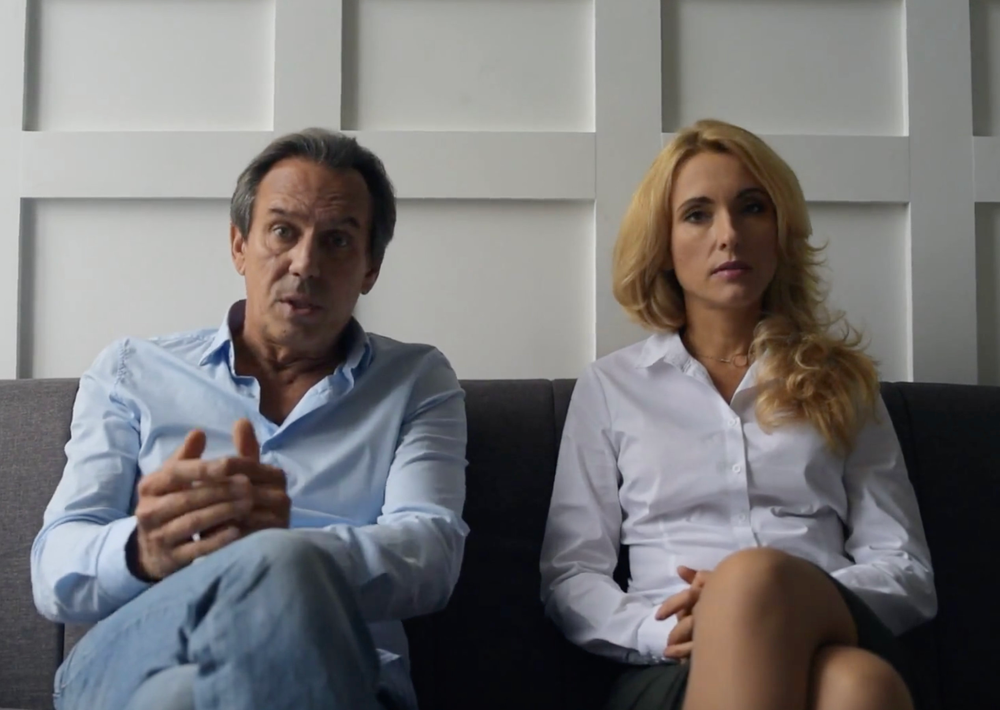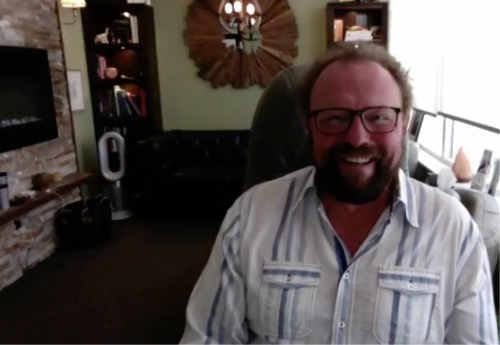Michael Dadson: Couples Counselling in the Time of Social Media, Digital Dating, Political Polemic, and COVID-19

A Perfect Storm of Economic, Social, and Cultural Pressures Faces Couples Today, According to Langley, BC Clinical Counsellor, Dr. Michael Dadson
Michael Dadson is a Clinical Counsellor, practising at Gentle Currents Therapy and Neurofeedback, a clinic in Langley, British Columbia. Clientele are generally seeking help for anxiety, depression, and post traumatic stress disorder (PTSD) but a large number of Langley area residents are coming in for couples counselling.

Couples Counselling at Gentle Currents Counselling and Neurofeedback
As you enter the office at Gentle Currents Therapy and Neurofeedback, the first thing you notice is the calm, earthy colours and natural materials incorporated in the décor. Says Dr. Michael Dadson:
“You’ll notice that we have a loveseat and several chairs. The clients are able to sit where they like, wherever they feel comfortable, and the loveseat is great for many couples. Sometimes, though, couples who come in for counselling don’t want to sit together on the loveseat and are more comfortable sitting in separate chairs. It’s important for them to feel at ease in the office, regardless of how they are feeling about the state of their relationship.”

Rising Divorce Rate and Pandemic-Related Stressors
It is not surprising that the divorce rate is increasing in light of many new and developing changes in everyday life for Canadians.
A piece on the cbc.ca website quotes Toronto lawyer, Ron Shulman, regarding what he calls “…huge uptick in new clients wanting to file for divorce.” Not only is there a backlog at the courts due to COVID-19 restrictions, it would appear that the pandemic is affecting marriages.
Global News features an interesting story about one such affected marriage in which the couple, who had been considering working on their marriage, decided to file for divorce after a very difficult experience with the pandemic, isolated together with their children and without access to outside support.
According to Dr. Michael Dadson:
“The pandemic is definitely putting a strain on couples. Many social and professional activities are no longer possible or have been curtailed. For example, if your way of coping with interpersonal strain was to go and work out at the gym, socialize with a friend, or throw yourself into your work at the office, your options have been reduced and conflicts at home, if anything, have increased.”
Not only do the changes to our culture affect government-mandated behaviours, now people all over the world are consuming news and scientific information from different sources which are sometimes contradictory.
At times, within a couple, there are widely disparate attitudes to the scope and danger of COVID-19 infection, which can leave one partner feeling controlled or micromanaged (“I don’t want you going out with your friends”) and another feeling endangered (“You are just being paranoid”).
Psychology Today published an interesting piece about such situations:
“My partner isn’t taking the social distancing seriously, I’m afraid they’re bringing germs back into our home.”
All you can control is yourself. You can speak to your partner about your feelings of fear and concern…. If your partner continues to put you and the family in danger, you might want to reconsider staying someplace else.

Additional Pressures on Already-Strained Relationships:
According to a “Happiness Column” by Jennifer Moss, any crisis, not just a pandemic, can cause rifts in relationships:
“People change in a crisis. When we face a major emotional event, particularly one of this magnitude, it forces us to take stock of our lives. We feel the limitations we have on time and our own mortality and that can speed up decisions, particularly about our relationships. Something that seemed acceptable before, may now seem intolerable.”
Says Dr. Michael Dadson:
“If a person is already having marital conflicts, the pandemic turns up the volume on those conflicts because they are limited in their ways of being able to cope with it”

Political Pressures on Relationships
Navigating modern relationships is a complicated matter and contributing to the pressures of a couple’s everyday life is the nebulous pressure of political partisanship.
Astonishingly, a scholarly article from Stanford delves into the intersection of politics and romance, finding that:
“… marital selection based on partisanship exceeds selection based on physical (e.g. body shape) or personality attributes…”
Or American neighbours appear to have fairly distinct political lines drawn in the sand of romance, according to Therapy Group of DC:
“Nearly 30 percent of married households are bipartisan. Typically, one member of the partnership is an independent; however, one-third of bipartisan couples are comprised of Democrats married to Republicans.”
In other words, two-thirds of bipartisan couples in the United States are comprised of a Republican or a Democrat who married an “independent” voter.
Canadians, although as a culture, seem to be more peaceable, are not immune to political disagreements within a couple, and indeed can be found arguing about American politics (the converse is probably very rare).
Says Dr. Michael Dadson:
“Even here in Canada, there seems to be a general negative effect on people’s mental health due to the current political climate.”

Reasons to Seek Couples Counselling
There are plenty of signs that you and your partner would be well-advised to seek couple counselling and most of them are very obvious.
Typical marital problems such as increased frequency or intensity of arguments, betrayal of trust, decline in physical and/or emotional intimacy are good reasons to seek therapy before these symptoms become ingrained.
Strongly consider therapy if contempt and criticism are part of your daily lives, as these are a sure sign that you probably have a very serious issue in your relationship.
Contempt
Some call contempt the number one predictor of divorce. An article on The Gottman Institute website refers to this symptom of a troubled relationship as the worst:
“Contempt is the most destructive … because it conveys, “I’m better than you. I don’t respect you.” It’s so destructive, in fact, that couples who are contemptuous of each other are more likely to suffer from infectious illness than couples who are not contemptuous of each other.”
An article listing 10 reasons to seek counseling at psychcentral.com refers to lack of respect for your partner’s opinion, a sense of superiority, in short, contempt:
“You don’t respect your partner’s opinion. In response to most things that they say, you roll your eyes, internally or outright. You genuinely think you are a better, more intelligent or more commonsensical person, and you don’t take their opinion to heart, probably ever if you’re honest with yourself. Or they feel and act this way about you.”
Criticism
Criticism can be the most toxic threat to a relationship, leaving the criticized partner feeling attacked, undervalued, and disrespected.
According to Zach Brittle, couples therapist:
“Criticism is when a complaint is expressed as a character flaw.”
In couples counselling, as in any kind of interpersonal relationships, Dr. Michael Dadson encourages clients:
“Treat others with kindness and empathy, trying to avoid at all costs a “blame-and-shame game.”

Digital Age Stressors on Relationships
One generation ago, couples didn’t worry about Facebook likes, suspicious friend requests, or mystery texts on a partner’s cell phone. Today, on the other hand, social media and texting can be a minefield of conflict within a relationship.
According to goodtherapy.org:
“Couples often have conflict regarding who to “friend,” what to “like,” and who to text, block, or chat. Communicating that is not done face-to-face or even on the phone is hard. No matter how many emojis are used, words can be misconstrued and misread. Tone of voice and body language are important to understanding what is being conveyed.”

Maybe You Need More Space in Your Relationship
Since March of 2020, many couples feel “trapped” or “stuck” with each other in various states of quarantine, feeling both isolated and crowded at the same time.
According to an article in psychologytoday.com, space and time apart can be helpful to your relationship:
“The Coronavirus pandemic has almost forced couples into “dyadic withdrawal,” or becoming hyper-involved with a partner at the expense of other relationships. It puts tremendous pressure on a relationship to expect that one person can fill all your emotional needs. …. As psychologist Terri Orbuch argues, “space” can be very healthy for your relationship and even your intimacy.”
According to Dr. Michael Dadson:
“Enjoying the outdoors either alone or with family members who live with you is always a safe and healthy way to decompress and relax. Going for a walk alone can even be a good way to have some space and time away from a partner when there is conflict, and sometimes this space can actually help both partners resolve their differences by having quiet time to process.”
Finding new love in pandemic times: “Love in the Time of COVID-19”
In the Gabriel Garcia Marques novel, “Love in The Time of Cholera”, lovers faced challenges which were shaped by the times in which they lived: times of plague. To be specific, the setting is probably somewhere in Colombia around the year 1880 and the plot ends sometime in the 1930s.
One wonders what a book named “Love in the Time of COVID-19” would be like.
It would be interesting to be able to look into the future to see how these times of COVID-19 will be viewed 50 years from now, but for the time being everyone on the planet is coping, puzzling, and innovating new approaches to everyday survival.
Thankfully there are plenty of COVID-19-friendly ways to meet singles these days. According to CBC.ca
“While some are struggling with their relationships or working on trying to strengthen them, others are looking for new people online. Alexander, who normally hosts in-person speed dating events in her capacity as owner of Singles in the Peg, has moved them online in light of the pandemic.”

Clinical Counselling and Your Objectives
With regards to family life and the state of marriage and divorce in Canada, Dr. Michael Dadson is committed to serving couples according to their goals.
Says Dadson:
“If their stated goal is that they would like to work on their relationship, then I will work for them and I will work with them towards that goal. If they decide that they want help navigating the end of their relationship, then I work with them to find a way forward that is least detrimental to each of them — and to the children.”
Whether you are embarking on a new relationship or working on an existing one, Dr. Dadson advises practising as much kindness and empathy as you can manage, no matter what issues you and your partner are facing.
Gentle Currents Counselling and Neurofeedback is currently open for in-person clinical counselling and Neurotherapy treatments. Secure online counselling sessions are also available by appointment in case you prefer to stay at home.
Dr. Michael Dadson, PHD
Jeanette Dadson, Neurofeedback Therapist
Gentle Currents
Counselling and Neurofeedback
Belmont Centre
#109 20103 40th Avenue
Langley BC, V3A 2W3
Call/Text: (778) 554-0174
info@gentlecurrentstherapy.com
